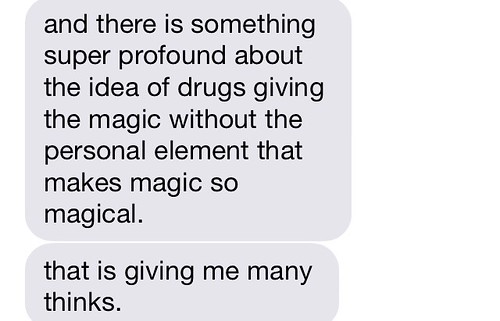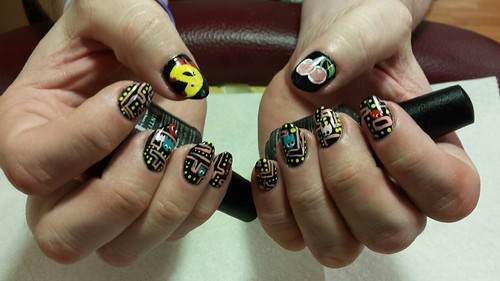My Ms Pac-Man Themed Nails, And, Oh Yeah, The Inadvertent Subtexts of Flex
So here’s a weird thing about writing a novel, one I knew about but never thought it would apply to me:
People read Philosophies into your text. Not the ones you meant to put in there, but new Philosophies. Interpretations of the text that you never considered when you were sweating blood trying to figure out how to get your lead character out of this burning warehouse without him getting killed.
Sometimes these Philosophies even reflect what you meant to say.
I first got a whiff of this when I got a text from my dear friend Jenna:

…at which point I went, “Wow, yeah, that is pretty much how I feel about drugs.” Which is not to say that there’s anything bad about drugs per se, but me personally, I feel like life is largely more interesting if you just go out and do interesting things as opposed to interesting chemicals, and that Philosophy seeped into Flex like toxins into groundwater.
Then I started reading other reviews by friends, like Bat, who I finally got to meet in Portland after knowing her for twelve e-years, and her (friends-locked) review was super-kind but said:
Ferrett uses opals as a detection system to warn people of ‘mancy usage. Being that there’s several types of opal, I’m guessing he just meant a common opal, although I kind of substituted fire opals in my head. Maybe because hematite is associated with earth/fire and opals are not only associated with water but also contain a lot more water then other minerals, their usage in the story makes sense. (During the 19th century, opals were considered to bring bad luck to anyone who wore them except for those whose birthstone it was.)
(YOU TOTALLY RESEARCHED ALL THAT AND USED THOSE TWO ON PURPOSE, RIGHT, FERRETT??)
There’s lots of video game (Frogger and Super Mario Bros for sure) and other pop culture references that become touchstones, especially for readers of my generation.
Another thing I’ll look at is names:
Paul – “humble, small”
Aliyah – “high, sublime”
Valentine – “strength, health” (makes total sense with her flavor of ‘mancy.)
Kit – (possibly short for Christopher – “Christ-bearer”)
Imani – “faith”
And while this is all a valid way of interpreting the text, I sure as hell didn’t put that in there. Why did I use opals? Because opals are, uh, pretty. And I used hematite because it was a cool name. I chose names at random, as I pretty much always do. “Hey, does Paul sound like a Paul? He’s Paulish. Let’s go with Paul.”
I do know authors (like Catherynne Valente and Kat Howard and many other catlike folk) who do choose names for their characters with extreme care, setting up their double-meanings quite cautiously, but me? I feel like a bull blundering through a Ming Vase exhibit, because I just choose at random and yet there’s all of this analysis here about what it could mean.
Which isn’t to say the analyses are bullshit! For one thing, as noted, the drugs-as-less-interesting-life-experience subtext is something I do believe, and it’s in there even though I utterly never meant to put it in there. For another, I feel very strongly that once I hand you this book, the book is yours; I wrote the characters, but you get to decide whether you like them, whether you like what they’re doing, whether you find what they’re doing is believable.
I didn’t put it in there consciously, but that doesn’t mean it’s there.
Then I think of GreyBeta’s review of Flex, where he says this:
Paul Tsabo is the name of our protagonist. So I thought of the Apostle Paul, who was the man formerly known as Saul the ardent persecutor of Christians. Saul then saw the light on the road to Damascus and changed his name to Paul and the Bible tells us that he went on to found several churches. Paul flipped from being a persecutor of Christians to a teacher of Christianity itself. Flex‘s Paul is a man tasked with tracking down ‘mancers, the magic users of the Flex world. That he would turn out to be a ‘mancer himself is part of the exposition phase of the novel.
This is actually exactly what happens, and it is a Biblical parallel, and it is a story I knew very well, and yet… I didn’t mean to put it in there. And yet people are reading my words and coming away with these other Philosophies, and where did those come from?
Then there’s stuff that people think I put in gratuitously, and I didn’t. I remember someone saying, “Hey, Kit told Paul to get a straight-razor shave, which seemed out of character until I remembered you had a straight-razor shaving phase,” and I did a double-take because Kit – an old-fashioned New York Jew who knows where all the old goodnesses of NYC are hidden – is precisely the sort of man who made me want to get straight-razor shaves, because all the old cranky NYC Jewish guys had this hidden vibe where they had a database of the best diners and the shvitzes and, yes, the straight-razor barbers who would neaten you up sweet. The straight razor isn’t gratuitous to me, it’s a signal of Kit’s proclivities, and yet it can be just as easily read as “Ferrett likes razors.”
So it’s weird. I’m not opposed to any of it, like I said, but it is odd to be reminded that people do not read the novel the author gave them; they read the novel an author brought them, and then fill it full of their own philosophies. The end result of every book reading is a collaboration, and I am honored to be so collaborated.
Now. Here’s my amazing Ms. Pac-Man nails, done by my Mad Manicurist Ashley, and she outdid herself this time:



Before you ask: about two and a half hours’ worth of work. Yes, I tip her well. Very well.


Haha, the thing about the apostle Paul is so incredibly appropriate! Amazing that it wasn’t intentional.
This whole thing tickled my brain about a LM Bujold quote. So I hunted it up. Reading the whole thing, I think it applies even more:
Reading is an active and elusive experience. Every reader, reading exactly the same text, will have a slightly different reading experience depending on what s/he projects into the words s/he sees, what strings of meaning and association those words call up in his/her (always) private mind. One can never therefore, talk about the quality of a book separately from the quality of the mind that is creating it by reading it, in the only place books live, in the secret mind. — “‘A Conversation With Lois McMaster Bujold”, an interview with Lillian Stewart Carl, p. 52